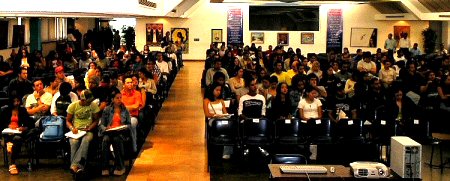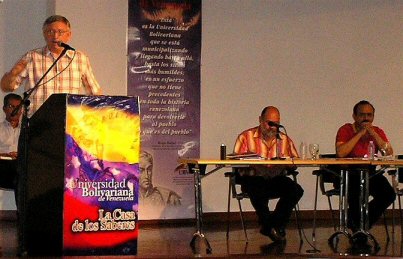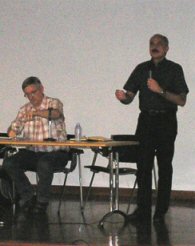
Solidarity
- 18 April 2005
On April 4th the Kitchener-Waterloo region saw
it’s first Hands Off Venezuela event. This is just one of a series of launch
meetings occurring across Canada. The movie The
Revolution Will Not Be Televised was shown in the University of Waterloo
Student Life Center. Despite the upcoming exam-week and problems getting
posters up on campus, 40 people came to the event. A variety of people showed
up including professors, graduate students, students, and even members of the
Venezuelan Opposition!

The event started off with a short introduction to capitalist developments in Latin America by guest speaker Alex Grant (of HOV-Toronto and Fightback). After the movie Alex spoke about the events in Venezuela after the 2002 coup with an emphasis on the 2004 referendum, the nationalization of Venepal under workers' control, the demoralization of the opposition, and Chavez’s recent turn to genuine democratic socialism.
The most successful aspect of the event, however, was the lively discussion afterwards. Everyone in the crowd seemed eager to either ask questions or freely comment. The members of the opposition attempted to provide their critiques of the Bolivarian revolution (anywhere from corruption in the referendum to complaints of violations against private property), which were met with much opposition from the crowd. At one point an opposition supporter, wearing a bright pink sorority sweater and sitting in the centre of the room, tried to assert that the military coup in 2002 was actually not a coup but some other “thing”. She also disagreed that the opposition is demoralized and asserted that they will come back – at which point Alex Grant agreed with them saying, “Yes, the opposition will come back if the revolution is unable to continue to improve the standard of living for Venezuelan workers and poor. If they come back they will have their revenge on the people like Pinochet’s bloodbath in Chile. That is why the Venezuelan workers must expropriate the oligarchy to stop their ability to wage economic terrorism.”
In a surprising twist, and without the guiding hand of its socialist organizers, the discussion naturally veered to a debate on Marxism, socialism, and revolution. This shows that even Canadians are aware of the great tasks ahead for the Bolivarian Revolution and what lessons Venezuela holds for Canadian workers and youth. Overall the event was a great success and plans are being made for future events at Waterloo.
Contact info: This email address is being protected from spambots. You need JavaScript enabled to view it.
- 15 April 2005
"We will never complete the revolution as long as private property is upheld"
From the Venezuelan Bolivarian University Press
Caracas, April 12, 2005. "If we continue to work under the thesis of reformism, it will be very difficult to create the revolutionary consciousness needed for the period of change we are living through, and we would be wasting all the effort carried out by our President Hugo Chavez Frias". This is what William Izarra, Vice Minister of Foreign Affairs for Asia and the Pacific, said during an event under the title "Socialism of the 21st Century". He was accompanied by Alan Woods, a British intellectual of the Revolutionary Marxist Current, Dr Orietta Caponi, Rector of the Venezuelan Bolivarian University, and the Secretary General Elizabeth Alves. The meeting was held in the Simon Bolivar hall of our studies house.
Izarra explained that we have entered a new stage of the process. This situation implies ideological definitions in order to take the right path between the two possibilities: reform or revolution. Reform implies the continuity of the political model of representative democracy and to continue to exercise a command model based on the fascination of power.
On the other hand there is revolution, a political model based on direct democracy, which means above all, to transform power into a tool of the people. It means transferring decision making to organised communities. "It is to rule on the basis of the right of the people to participate, to give constitutional consistency to the sovereign acts of the national collective" said Comandante Izarra.
Alan Woods, strengthening what had been said by Izarra, pointed out that the reformist behaviour is simply the expression of counter-revolution. "This is why I say, and I insist on this, that many times a victory can be turned into a defeat if there isn't a leadership which is consistent and coherent with this period".
The British intellectual recounted the epic intervention of the Venezuelan people during the coup d'etat on April 11, 2002, explaining how that popular uprising had no parallels anywhere in the world, and was unprecedented in any country of Latin America.
Woods explained that Venezuela is living through a revolution which has only gone half way, because as long as the oligarchy exists with its economic power intact we cannot speak of a revolution as such, "unfortunately, as long as private property is upheld, we will never have a complete revolution".
The Marxist leader ended by saying that Venezuela is at the crossroads: either we achieve the most important political and social victory in our contemporary history or we will suffer the most crushing of defeats, "either we defeat the counter-revolution, or it will defeat us".
- 13 April 2005
 |
On Monday April 11 and Tuesday April 12, the Revolutionary Marxist Current (CMR) organized two very successful public meetings at the Bolivarian University. In the first meeting there were five hundred people and in the second over four hundred. The audience consisted mainly of young people, students and Bolivarian activists, but in both meetings there was a fair number of workers and trade unionists.
The subject of the first meeting was “Workers’ Control, Venepal Shows the Way”. The subject of the second meting was “Socialism in the 21st Century”. The speakers on Monday were Jorge Paredes, one of the leaders of the occupied factory Costructor Nacional de Valvulas, Luis Primo, of the regional executive of the UNT in Caracas and Miranda, Ricardo Galindez, a leader of the oil workers’ union in Lara and editor of the Marxist paper, Topo Obrero. The last speaker was Alan Woods, editor of Marxist.com.
 |
CNV workers with Alan Woods and Pablo Cormenzana (CMR) |
The response of the audience was enthusiastic, in both meetings. The speakers emphasised the need for the Bolivarian Revolution to go beyond the limits of capitalism, for the workers to follow the example of Venepal and introduce workers’ control as a step towards nationalisation and a socialist planned economy. This position was warmly applauded by those present, many of whom feel that the revolution has not gone far enough. The argument that it is necessary to combat bureaucracy and introduce control from below got a particularly keen applause.
On Tuesday there were just two speakers. The first was Comandante William Izarra, the Vice Minister of Foreign Affairs. Comrade Izarra has been identified with the left wing of the Bolivarian Movement. In his speech he emphasised that so far the Revolution had carried out reforms but had not brought about a fundamental change. He likened this to pruning a tree and picking the flowers, whereas what was needed was to attack the roots. Socialism, he said, must mean that power must pass to the people.
William Izarra stressed that it was impossible to carry out a revolution while the old state apparatus remained intact, all the old judges, bureaucrats and governors were an obstacle in the road of advance that must be removed. These points were greeted with wild applause and cries of “Power to the People” and “Power to the Workers”. Comrade Izarra expressed his thanks to the Revolutionary Marxist Current for inviting him and expressed the wish for the collaboration of all genuinely revolutionary forces.
 |
Alan Woods speaking, Luis Primo (UNT Caracas) and Ricardo Galindez (CMR) on platform |
The second speaker, Alan Woods, was greeted with warm applause. He is already widely known for his consistent defence of the Revolution and also for his continued advocacy of socialism. Alan welcomed the declarations of Hugo Chavez that capitalism is slavery and that the Bolivarian Revolution must advance to socialism. Alan warned that the counter-revolution was not yet defeated and that it was dangerous to spread illusions.
He pointed out that the motor force of the Revolution was the masses and above all the working class. He stressed that there was no way forward unless the Revolution expropriated the oligarchy and nationalised the land, the banks and the big companies under workers’ control. Those who opposed this on the grounds of so-called realism were really the worst utopians. Unless this step was taken, the correlation of class forces, which was very favourable, would inevitably change. Workers would become disappointed and fall into apathy. At that point the counter-revolution would strike. Either we smash the counter-revolutionaries, or they will smash us, he said.
 |
William Izarra speaking |
Alan emphasised that although the Bolivarian Revolution had its own unique personality and specific identity, it had to learn from other revolutions of the past, especially the Russian Revolution. Alan quoted Lenin’s programme of four points and showed that these were absolutely relevant to Venezuela today. The audience was particularly enthusiastic about the demand for the recall of bureaucrats and a limitation on the salaries of all functionaries. When Alan cited Lenin’s demand to arm the people, there were loud chants in favour of a people’s militia. The workers of Venezuela are ready to fight.
After a lively debate in which different views were freely
expressed, analysed and criticised, the meeting ended in a mood of
euphoria. At the end, comrade Woods appealed to all present to help in
the building of a genuine Marxist revolutionary tendency in the
Bolivarian Movement, a tendency represented by the Revolutionary
Marxist Current. The Current has grown rapidly in size and influence,
as the success of these meetings clearly showed. The reason for this
success is quite clear. The Marxists are expressing consciously the
real aspirations of the workers and the revolutionary people.
- 11 April 2005
As Martin Pacherco, Venezuelan General Consul in Boston opened the meeting, he welcomed all who wish to attain a understanding between the people of the United States and Venezuela. Other speakers were Caracas Metropolitian Mayor Juan Barrito, Maria Pilar Hernandez; vice minister for North America Affairs and Bernardo Alvarez; Ambassador to the United States.
Jorge Marin from the Martin Luther King Bolivarian Circles thanked the groups, Tech Exchange, International Action Center, the Boston Bus Drivers Union and the Hands Off Venezuela Campaign for their help in building a solidarity movement with the people of the Bolivarian Republic of Venezuela.
Now you can listen to the event below:
The audio recording of the Venezuelan Cultural Night (March 17, 2005) is now available for download.
http://web.mit.edu/hemisphere/events/venezuela/
- 07 April 2005
Trade unionists and members of public made direct contact with the revolution in the Bolivarian Republic of Venezuela on Wednesday 30th March
Two Venezuelan leaders for La Victoria (one hour west of Caracas)
spoke to the group in the first international Internet conference
between British activists and Bolivarian revolutionaries in Venezuela.
Over 30 activists from around Britain, some travelling over 80 miles,
heard the Venezuelans deliver their message in Spanish through an
interpreter prior to watching the film documentary, The Revolution Will
Not Be Televised in a cinema in Wolverhampton. Héctor Díaz Piña spoke
to the group about the role of the People of Venezuela in defending
their national sovereignty. Mr. Piña has a clear understanding of the
dynamics and structure of revolution due to his extensive study of
revolutions around the world. He was in contact with then Lieutenant
Colonel Hugo Chavez while Chavez was in Yare penitentiary and was also
in his bodyguard unit in Aragua state. This was during the period when
Chavez toured the country from March 1994 forward, developing support
all over the country.
Carlos Ojeda provided a vision from the active membership in the trade
unions. Carlos described the infrastructure of non-violent revolution
and explained why Venezuelan President Hugo Chavez Frias has such
massive support by Venezuelan workers. Carlos is a local leader who
helps people in communities understand and develop their roles in the
Bolivarian revolution.
Using the internet based software Skype, participants were able to
listen to and talk with activists in Venezuela and the US. The meeting
heard contributions which covered the increasing democratization of the
country with massive participation of millions of people determined to
make their lives better. The importance of deepening the mass
participation in the process, linked with building support for the
revolution across South America and worldwide, was recognized and
discussed.
Following the meeting, at which people asked questions of both the
Venezuelan activists and Les Blough, founder of Axis of Logic in the
United States, all participants stayed to see the important film
documentary The Revolution will Not Be Televised. For the overwhelming
majority, this was the first opportunity they had to witness the
historic documentary. The particpant's enthusiastic reception and
comments demonstrated proof of peoples interest in the ongoing
revolution in Latin America and their anger at the illegal attempts by
the US and fascist opposition to bring down the Chavez government.
Those who delivered the discussion and film agreed to hold similar
international events in the future. They also recognize that the role
of women in the revolution in Venezuela was critical and plan to bring
Venezuela's Bolivarian women present in the future. The next session of
the increased solidarity work will watch the film, enter the Oil
workers, which shows the magnificent role played by women in defeating
the bosses lockout.
The potential for using the new technology is increasing daily. With
the ever increasing manipulation of the news by the big business media,
novel and imaginative use of this technology will assist all workers
worldwide in defending themselves and resisting lies and fascism. The
next meeting using this technology is scheduled to be held in New
Zealand on April 9th. The technology used will enable Venezuelans to
speak with any country in the world and, bearing in mind the tough time
that Bolivarian Groups are having in Miami, this would be an ideal
setting to hold a future Skype conference.
Any groups interested, from any country in the world in setting up an
international conference of this nature, should contact the author of
this piece.
Andy Goodall
Coordinator Venezuela Solidarity UK
This email address is being protected from spambots. You need JavaScript enabled to view it.
www.venezuelasolidarity.org.uk
 Please help build the campaign by
Please help build the campaign by